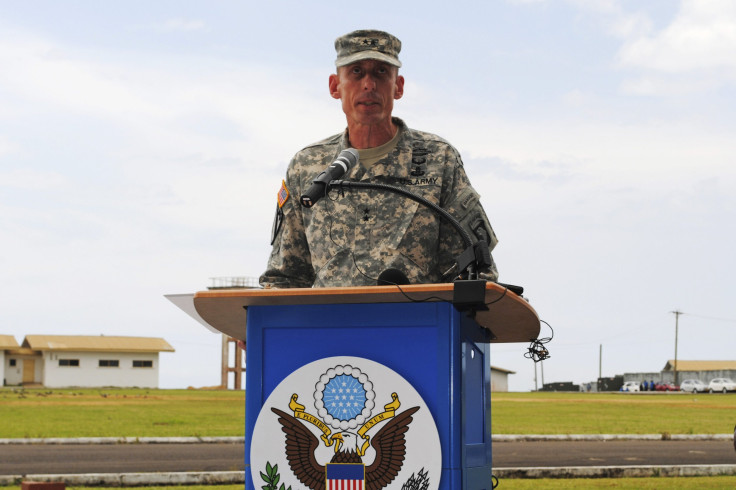US Military Ebola Dispatches: Servicemen On The Front Lines Talk of Hunger and Corruption in Disease Hit Nations

A thriving black market in blood, poor food supply, civil unrest, distrust of national governments, poverty and corruption are among the concerns cited in U.S. military dispatches from Ebola-hit West Africa over the past few weeks.
Reviewing six weeks of summaries of the crisis by officers assigned to Operation United Assistance, the Pentagon's aid program, NBC News paints a grim picture of the situation in Liberia, Guinea and Sierra Leone, where Ebola is nowhere near being controlled.
Almost 40 percent of all the farms in Sierra Leone have been abandoned, says an October 14 report, that quotes a UN agricultural official warning that it could lead to "a hunger crisis of epic scale in West Africa."
The food supply is becoming scarce, increasing reliance on potentially infected bush meat.
Women being responsible for preparing food are at increased risk of contracting the virus through infected meat. Already, Ebola has claimed more women victims, accounting for between 55 percent and 75 percent of the dead in the three nations.
Living in ''premodern and prescientific environments'', most of the rural populace believe Ebola is caused by witchcraft, note the military dispatches.
John Campbell, director of the African program at the Council on Foreign Relations, says that distrust of government is "particularly acute in those three states because they have had civil wars in recent years."
Distrust of government
Burial teams and healthcare workers face the brunt of the local distrust. In many places, burial teams have been taking bribes in order to leave bodies behind to be buried in a traditional manner. They have also been handing out certificates that the dead were not killed by Ebola, resulting in underreporting of cases.
Rural clinics often lack low-level local medical staff, many of whom have already died from the virus. Without such staff, other international assistance is "useless," an analyst writes.
Non-payment of staff has worsened the situation. At a Sierra Leone hospital, 38 staff members have died and those remaining hadn't been paid in two weeks.
The death toll from the Ebola epidemic rose to 4,922 out of 10,141 known cases in eight countries through October 23, the World Health Organization said on Saturday.
Accounting for unreported cases and those turned away at centers, the actual numbers could be three times as high by a factor of 1.5 in Guinea, 2 in Sierra Leone and 2.5 in Liberia.
Another poor nation on Ebola radar
The death of a child from Mali has alerted the WHO and volunteers about people now exposed to the virus as the girl had travelled hundreds of kilometers when ill.
Health workers are scrambling to trace the potential contacts in a bid to prevent Ebola taking hold in Mali, one of the world's poorest countries, recovering from unrest and war against Islamic fundamentalists.
US cities to quarantine health workers
In the US, a mandatory 21-day quarantine imposed by New York and New Jersey on health care workers returning from West Africa after treating Ebola has led to surprise and concern among federal officials who fear the move would deter volunteers wanting to travel to Ebola hit nations.
The quarantine was abruptly implemented by the governors of New York and New Jersey, Andrew Cuomo and Chris Christie, without any consultation, reports CNN.
"These individuals who are going there to serve are the people who will end this crisis," New York Mayor Bill de Blasio said. "We can't have the illusion that we can turn away from it and some day it may end. If we took that attitude, this would be a truly devastating global crisis."
Meanwhile, the New York doctor being treated for Ebola at Bellevue Hospital has been given plasma from the blood of one of the survivors Nancy Writebol.
Dallas nurse Nina Pham has been declared Ebola-free.
A nurse who was tested negative has criticized the quarantine conditions imposed on her at New Jersey where disorganization and fear ruled the day. Despite testing negative, she like others will now be held in a 21-day quarantine.




















